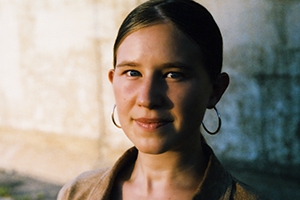Literature
Witnessing Race

Author Eula Biss
Rising literary star Eula Biss, author of Notes from No Man’s Land: American Essays, will discuss her work with AU students on September 3 as part of the 16th annual Writer as Witness program. The book, which first year students were asked to read over the summer, provides a common text to discuss soon after they arrive on campus.
Winner of the Graywolf Press Nonfiction Prize and the National Book Critics Circle Award, Notes from No Man’s Land confronts the issue of race in America from sometimes oblique angles. An essay on the history of telephone poles, for example, soon becomes a litany of dates and places where phone poles were used as gallows to lynch black men. Other essays move from doll studies in which most children—including black children—identify a white doll as “good” and a black doll as “bad” to the Biss family’s somewhat complicated racial identity to the author’s life as a schoolteacher in Harlem and as a white reporter for a black community newspaper in San Diego.
Wrote Kyle Minor in Salon, “Eula Biss’ Notes From No Man’s Land is the most accomplished book of essays anyone has written or published so far in the 21st century.”
“It was at the top of the committee’s list pretty unanimously,” said Mary Switalski, professorial lecturer in the College of Arts and Sciences’ Department of Literature and chair of the Writer as Witness Committee. “We all vote for our personal top 10s and this was on everyone’s list. None of the members of the committee could put it down. We felt the essays were really daring, and they were also artistically authentic. And furthermore, we just thought that the quality of the prose and the way she used research was very compelling.”
Biss is excited about the opportunity to read her work at AU.
“It is thrilling for me to know that an entire community is reading my work and building conversations around it,” Biss said of her upcoming AU appearance. “I don’t think my presence is essential to that process, but the opportunity to see it underway is something of a treat. My own thinking is often clarified and extended by talking with students.”
Biss, also the author of The Balloonists, teaches nonfiction writing at Northwestern University.
John Hyman, director of the College Writing Program and Writing Center, said students meeting authors like Biss can help dispel myths about the writing process.
“Our students come to us with a host of assumptions about college, about writing, about race in America no doubt,” Hyman said. “And I think this book will test some of those assumptions. I think students sometimes feel that writing, especially perhaps contemporary nonfiction writing, has to be either research-driven—which in their view means dry, pedantic—or it can be lyrical and uplifting. Here we have a [thoroughly researched] book that is lyrical right down to almost every sentence.”
The writing process is full of surprises for authors as well, as Biss discovered in putting her book together.
“I wrote the book essay by essay, over the course of about seven years,” Biss wrote in an email. “I did not write the essays in the order in which they now appear (the first essay is one of the last I wrote), and I did not know, for most of those years of writing, that I was working towards a book. Each essay was its own project and its own problem. Only after an editor asked me if I could put together a collection of essays did I look over everything I had written and see that I could build a book around the theme of racial history and racial identity. But this theme was not immediately apparent, which is a bit surprising to me now, considering how obvious that theme is in the finished book.”
Writer as Witness books often resonate beyond student essays and discussions, Switalski noted.
In 2011, for example, David Finkel’s The Good Soldiers, about the U.S. troop surge in Iraq, inspired AU’s military veterans to meet with classes and share their experiences. Last year, Seamus McGraw’s The End of Country led to an alternative spring break trip to Pennsylvania to explore the environmental and social costs of fracking.
“While it serves our learning objectives and our classroom goals,” Switalski said of the program, “it’s wonderful when it can help a student grow in all kinds of ways academically and personally.”
Notes will also be the subject of essays in College Writing and Honors English classes. And an essay contest, cosponsored by the College Writing Program and the Campus Store, will award prizes for the best writing, in any genre, inspired by the book.
Biss will talk about her book and answer students’ questions at 8 p.m. September 3 in Bender Arena. The next day she will meet incoming students of the Honors Program, as well as with Department of Literature faculty.

